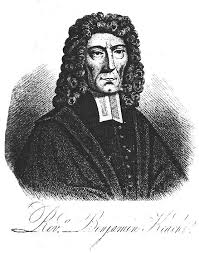


Benjamin Keach
Repertoire:
(1640-1704)
If ancient church records can be believed, Baptists have not always enjoyed singing in church, especially those songs of “human composure.” But is was a Baptist pastor who is considered to be the leader in establishing the idea of congregational singing versus the established Metrical Psalm singing that was currently in use in all the churches. It was during the English Reformation that all hymns had been removed from the service of the Anglican Church in preference to Metrical Psalms. This became the practice not only in the established Church of England but also in the Dissenting Churches such as Baptists and Congregationalists.
Of course, Baptists were not the only group with this discussion taking place. Luther’s attitude was that God’s people should use whatever they could to praise Him as long as it was not contrary to the teaching of Scripture. John Calvin had a more restricted approach. He taught that Christians should use only what was contained in Scripture. He was the leading proponent of the practice of singing metrical Psalms only. That practice became the songbook of English Protestants up to the time of Pastor Keach.
Benjamin Keach was born in Stoke Hammond, Buckinghamshire, February 1640. He was apparently converted sometime after his fifteenth birthday and joined a neighboring Baptist Church. About three years later he began to preach in local churches. He was arrested at least twice after the Act of Uniformity was passed in 1662 and threatened by the soldiers to be trampled to death by their horses if he did not stop preaching. In 1664, he was arrested, indicted, tried before the Lord Chief Justice who directed the jury to bring in a verdict of guilty, and found guilty for publishing a book, “The Child’s Instructor, or a New and Easy Primer.”
Sometime later in 1668, Keach was called by a small Particular Baptist Church to be their pastor. They met in a private house but after the Declaration of Indulgence in 1672, a meeting-house was erected in Southwark. Apparently, the Lord blessed the work. He remained there for 36 years as their Pastor and the building expanded several times. It was as representative of this church that Keach went to the 1689 General Assembly and subscribed the 1689 London Baptist Confession of Faith.
It was here, Pastor Keach, with the consent of his church, introduced the practice of singing a hymn at the Lord’s Supper. Later, he added singing in the church on their thanksgiving days. Finally, in 1690, the church, with only a few dissenting voices, voted to sing a hymn every Lord’s day with the song after the sermon so that those who opposed the singing would be free to leave, which they did and waited in the church yard until the song was done. In 1691, in an attempt to settle the dispute in his congregation and the Particular Baptist Association, Pastor Keach published a paper in favor of the new practice. The title was not misleading in his position: “The Breach Repaired in God’s Worship, or Singing of Psalms, Hymns, and Spiritual Songs Proved to be an Holy Ordinance of Jesus Christ.” In this he describes congregational singing: “Singing is not a simple heart singing, or mental singing; but a musical melodious modulation, or tuning of the voice. Singing is a duty performed always with the voice, and cannot be done without the tongue.”
Hymn singing continued to be a very controversial practice, but Bro. Keach and others persisted, and hymn singing eventually became generally accepted thanks in large part to the publication in 1707 by Isaac Watts of his “Hymns and Spiritual Songs”.
Benjamin Keach remained pastor of the church at Horsleydown until his death, which occurred July 18, 1704. His funeral sermon was preached by Rev. Joseph Stennett.
(This will be a continuing column in the coming columns.)
